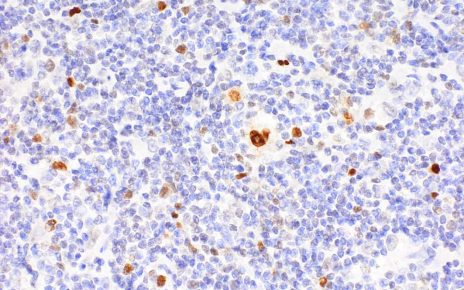How KISSING can spread gonorrhoea: Saliva exchange ‘is now a bigger risk than performing oral sex’, scientists warn amid spread of super strain of the STI
- Researchers in Melbourne, Australia, surveyed 3,000 gay and bisexual men
- Gonorrhoea was more likely to be found in the throat than the penis or anus
- Mouth-to-mouth spread of the STI may be more common than expected
Kissing with tongues can spread the sexually transmitted infection gonorrhoea, researchers have warned.
Scientists say the STI can be caught through saliva – despite the NHS dismissing kissing as a way of passing it on.
And spreading the infection this way may be more common than expected, the Australian researchers claimed.
They found gay men were more likely to have gonorrhoea in their throat than their penis – and the risk of spreading it was greater for kissing than for oral sex.
Antiseptic mouthwash could, the scientists suggested, be created to try and kill the bacteria, which can cause a sore throat and swollen lymph nodes.
The research into oropharyngeal gonorrhoea comes amid growing concerns about ‘super’ strains of the STI that are becoming resistant to medicine.

Gonorrhoea is an infection caused by bacteria which can live in the genitals, anus, mouth or eye and also cause illness elsewhere in the body. Scientists in Melbourne, Australia, said mouth-to-mouth transmission could be more common than previously thought (stock image)
Scientists at Monash University and the Melbourne Sexual Health Centre in Australia surveyed around 3,000 gay and bisexual men in the city.
‘A number of pieces of evidence suggest transmission from the oropharynx [back of the throat] may be more common than previously thought,’ Professor Eric Chow and his colleagues wrote in the paper.
‘[The bacteria] can be cultured from saliva, suggesting that the exchange of saliva between individuals may potentially transmit gonorrhoea.
‘Several case reports in the 1970s suggested kissing as a mode of transmission for oropharyngeal gonorrhoea… but kissing has always been neglected as a risk factor’.
Professor Chow said a rise in global reports of gonorrhoea strains which are evolving to stop antibiotics working against them is cause for concern.
Doctors and scientists must find new ways of stopping the infection, he warned, and efforts are currently focused on encouraging condom use during sex.
Discovering a way the bacteria are spreading under the radar could lead to new ways of spotting it sooner and preventing infections.
Men in the study were more likely to have gonorrhoea in their throat than in their penis or anus, the researchers found.
WHAT ARE THE SYMPTOMS OF THROAT GONORRHOEA?
More than 35,000 people a year are infected with gonorrhoea in England, and only chlamydia and genital warts are more prevalent.
Figures show 78million people worldwide contract gonorrhoea, which can often go symptomless for weeks, each year.
Symptoms usually strike within two weeks of infection – but can stay hidden for many months.
If someone gets a gonorrhoea infection in their throat it can cause a sore throat or swelling of the lymph nodes – small glands in the neck. In women, symptoms of gonorrhoea can include:
- an unusual vaginal discharge, which may be thin or watery and green or yellow in colour
- pain or a burning sensation when passing urine
- pain or tenderness in the lower abdominal area (this is less common)
- bleeding between periods, heavier periods and bleeding after sex (this is less common)
In men, symptoms of gonorrhoea can include:
- an unusual discharge from the tip of the penis, which may be white, yellow or green
- pain or a burning sensation when urinating
- inflammation (swelling) of the foreskin
- pain or tenderness in the testicles (this is rare)
Source: NHS Choices
More than six per cent had the infection in their mouth while just under six per cent had it in their anus, and only three per cent in the penis.
And the proportion of men with the STI was higher in a small group (52 men) who reported having only kissed men in the past three months without having sex.
Those who did the opposite – sex without kissing – were the least likely to have the STI, compared to only-kissers or those who did both.
Kissing more partners also led to a significantly higher risk of the infection – those who French-kissed four or more men were 46 per cent more likely to have it.
This risk rose to 81 per cent if they also had sex with the people they kissed, showing the risk increase for sex (35 per cent) was smaller than that for kissing.
‘Previously, it has generally been assumed that oropharyngeal gonorrhoea can only be acquired from an infected penis or anus, not from another man’s [throat],’ the researchers said.
‘Hence, the importance of the oropharynx has been neglected in gonorrhoea transmission.
‘Our results suggest kissing with or without sex may be a risk factor for oropharyngeal gonorrhoea.’
In contrast to the team’s findings, the NHS website says: ‘Gonorrhoea is not spread by kissing, hugging, swimming pools, toilet seats, or sharing baths, towels, cups, plates or cutlery.’
The scientists added that using spit as lubricant during sex or oral contact with the anus could also spread the infection from the throat to the anus or genitals.
They acknowledged the study, based on homosexual men at only one sexual health centre, may be difficult to apply to the wider population, but women can also catch oral gonorrhoea.
Super gonorrhoea – strains of the infection which have evolved to resist treatment with typical antibiotics – is becoming a growing concern around the world.
Experts have warned it will only be a matter of time until the infection becomes untreatable with current methods.
Two women in the UK were this year among the first to be diagnosed with super gonorrhoea, with both their infections being traced back to holidayers in Ibiza.
The research is published in the journal Sexually Transmitted Infections, part of the British Medical Journal.
WHAT IS SUPER GONORRHOEA?
When gonorrhoea is resistant to one of two antibiotics recommended to treat it, it is known as super gonorrhoea.
All types of gonorrhoea – historically called ‘the clap’ – are caused by the bacteria Neisseria gonorrhoeae.
It is quick to develop and strains mutate every few years to become resistant to drugs.
Doctors have frequently changed their recommended treatments to keep up with the changing nature of the bug. It stopped responding to penicillin in the 1980s.
Symptoms of gonorrhoea include discharge, bleeding or pain when urinating.
Yet around one in two women and one in 10 men will not experience any signs, which is why the infection is so easily spread.
Women who do not get treatment can develop pelvic inflammatory disease – an infection of the womb and ovaries which can cause infertility.
In pregnancy, it can cause miscarriage, premature birth or lead to babies developing problems with their vision.
Patients with super gonorrhoea can be given other treatments, which might work but can have unpleasant side effects.
Health experts warn it is only a matter of time before the bug mutates to resist these remaining antibiotics too. They recommend using condoms and regular testing to prevent spread of the disease.
Source: Read Full Article



